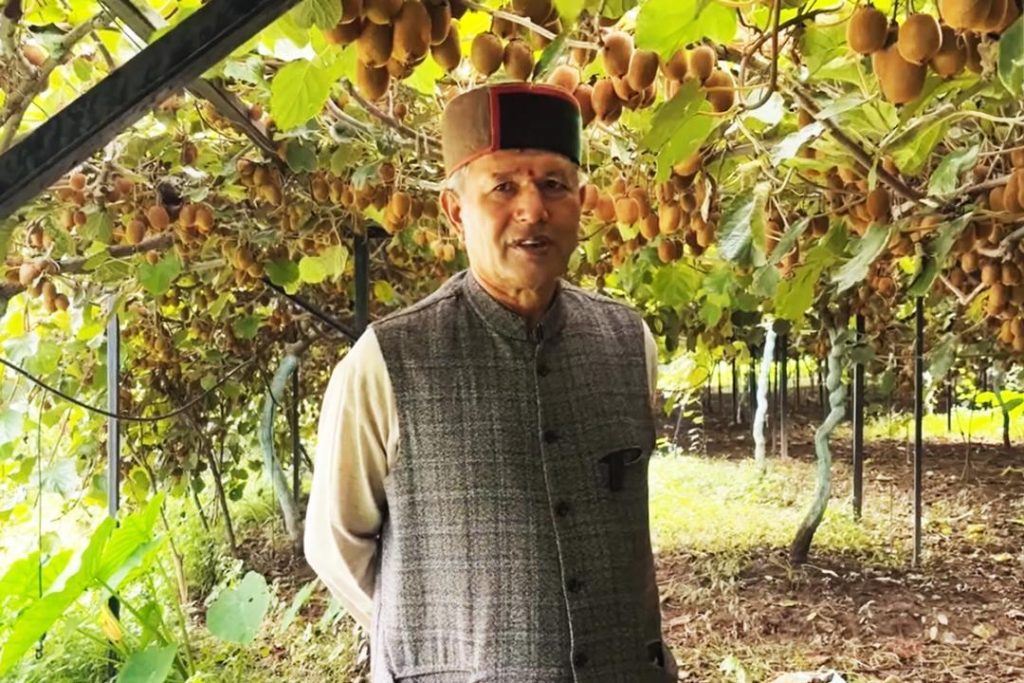
Solan Farmer Earns ₹21 Lakh/Acre with Organic Kiwi Farming
In a remarkable feat of sustainable farming, Pratap Bharnal, a farmer from Solan, Himachal Pradesh, has demonstrated the potential of organic kiwi farming by earning a whopping ₹21 lakh per acre. Bharnal’s journey began in 2017, when he decided to diversify away from apples, which were facing declining rates. He started with 100 kiwi saplings and now has 400 kiwi plants, yielding an average of 52 kg every season.
The story of Bharnal’s success is not just about earning a high income, but also about his commitment to sustainable and eco-friendly farming practices. He uses only water and cow dung manure to nurture his kiwi plants, rejecting the use of chemical pesticides and fertilizers. This approach not only benefits the environment but also results in higher-quality produce.
Bharnal’s journey into organic kiwi farming began with a simple realization – that the apple market was declining, and he needed to diversify his crops to ensure a stable income. He started researching different options and eventually settled on kiwi farming. With the help of local experts, he planted 100 kiwi saplings on his 1-acre land and began to tend to them using organic methods.
The initial years were challenging, but Bharnal persevered, learning from his mistakes and refining his techniques. He experimented with different irrigation methods, soil compositions, and pest management strategies to ensure that his kiwi plants thrived. Slowly but surely, his efforts paid off, and his kiwi yield began to increase.
Today, Bharnal’s 400 kiwi plants yield an average of 52 kg every season, with a total harvest of 21,600 kg last season. This impressive yield has translated into a significant income, with Bharnal earning a whopping ₹21 lakh per acre. This is a remarkable achievement, especially considering that the initial investment in kiwi farming was relatively low.
So, what sets Bharnal’s organic kiwi farming apart from traditional methods? For starters, he uses only water and cow dung manure to nourish his kiwi plants, eliminating the need for chemical pesticides and fertilizers. This approach not only reduces the environmental impact of his farm but also results in higher-quality produce.
Bharnal’s commitment to sustainable farming practices is evident in the way he manages pests and diseases. Instead of relying on chemical pesticides, he uses natural methods such as introducing beneficial insects and practicing good soil health to control pests and diseases. This approach not only reduces his reliance on external inputs but also promotes a balanced ecosystem.
Another key factor in Bharnal’s success is his focus on soil health. He uses cow dung manure to enrich the soil, which not only reduces the need for chemical fertilizers but also increases the soil’s water-holding capacity. This approach also promotes healthy microbial activity, which is essential for plant growth and development.
Bharnal’s story is a testament to the potential of organic kiwi farming and the importance of sustainable farming practices. As the world grapples with the challenges of climate change, soil degradation, and water scarcity, farmers like Bharnal are demonstrating that it is possible to produce high-quality crops while minimizing the environmental impact.
In conclusion, Pratap Bharnal’s remarkable achievement of earning ₹21 lakh per acre with organic kiwi farming is a shining example of the potential of sustainable agriculture. His commitment to using only water and cow dung manure, rejecting chemical pesticides and fertilizers, and promoting soil health is a model that other farmers can follow. As we move forward, it is essential that we prioritize sustainable farming practices like Bharnal’s, not just for the benefit of the environment but also for the long-term viability of our agricultural sector.






